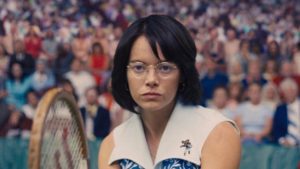 ‘Battle of the Sexes’ is a feel-good sports drama about the tennis match between Billie Jean King (Emma Stone) and Bobby Riggs (Steve Carell) in 1973. Although the exhibition match was a hyped-up media circus, it attracted an audience of over 90 million on television. It was written by Oscar-winner Simon Beaufoy (Slumdog Millionaire) and directed by the husband/wife duo Jonathan Dayton and Valerie Faris (Little Miss Sunshine). The real-life event is historically significant for the women’s liberation movement in the 1970s. It’s not really the match itself in the third act that is the most gripping but all the struggles King faced leading up to the showdown against Riggs. Stone’s performance in the lead role is outstanding and the main reason not to miss ‘Battle of the Sexes.’
‘Battle of the Sexes’ is a feel-good sports drama about the tennis match between Billie Jean King (Emma Stone) and Bobby Riggs (Steve Carell) in 1973. Although the exhibition match was a hyped-up media circus, it attracted an audience of over 90 million on television. It was written by Oscar-winner Simon Beaufoy (Slumdog Millionaire) and directed by the husband/wife duo Jonathan Dayton and Valerie Faris (Little Miss Sunshine). The real-life event is historically significant for the women’s liberation movement in the 1970s. It’s not really the match itself in the third act that is the most gripping but all the struggles King faced leading up to the showdown against Riggs. Stone’s performance in the lead role is outstanding and the main reason not to miss ‘Battle of the Sexes.’
The first half of the movie focuses on how King organizes a boycott of a major tennis tournament where men were paid more than women in prize money. It helped establish the Women’s Tennis Association with the help of Gladys Heldman (Sarah Silverman), founder of World Tennis Magazine. She supported King and eight other female tennis players who signed a symbolic $1 contract. Former tennis player and tour promoter Jack Kramer (Bill Pullman) is the real villain of the story and not Riggs by threatening to ban the women from the tennis association. Heldman secures a major sponsorship with Virginia Slims. Remember when cigarettes could be advertised in television commercials? The new Women’s Tennis Association is a big success and the pay disparity between male and female tennis players trickles over and gains national attention.
The battle cry that the good old boys like Kramer started was that female tennis players could never be as good as male tennis players so they shouldn’t earn as much as the men. King’s argument was that women’s tennis matches were selling just as many tickets as men’s tennis matches so they should earn equal pay. Riggs was a washed up tennis pro with an appetite for gambling. Even though he was married to a wealthy heiress (Elizabeth Shue), the war over gender roles was Riggs’ opportunity to cash in with the publicity stunt. At first, King wanted no part in the match against the 55-year-old. She finally accepted after Riggs firmly beat top-ranked women’s player Australian Margaret Court (Jessica McNamee) which gave him bragging rights as the symbolic male chauvinist pig. Carell’s over-the-top performance accurately depicts his cartoonish showmanship.
When the film focuses on King’s personal life, it becomes particularly engaging. It covers her burgeoning lesbian relationship with her hairdresser Marilyn Barnett (Andrea Riseborough). It is handled delicately during a time when a top athlete could lose major sponsorship if it leaked out to the public. Another challenge for King is that she is married to a man (Austin Stowell). Riseborough is fetching as the lover even though the romance is a bit glossed over so it never takes away from the tennis match in the third act. Stone is terrific at portraying very feminine characters in her films. In ‘Battle of the Sexes, she not only looks like King but actually gets lost in the character. It’s a dazzling performance by the Oscar-winning actress. Another aspect that Stone gets right is that King never wanted all the media attention over the tennis match. She felt when Court lost to Riggs, she had no other choice but take him on to fight for a higher cause over gender equality.
The final showdown is authentically shot to reenact the tennis match. For those that were too young to see the actual match on television or don’t want to spoil it with a quick Google search, the outcome won’t be revealed here. The film’s strong cast, real-life story and relevant social themes make it worth your time. ‘Battle of the Sexes’ serves up a solid game, set and match.


